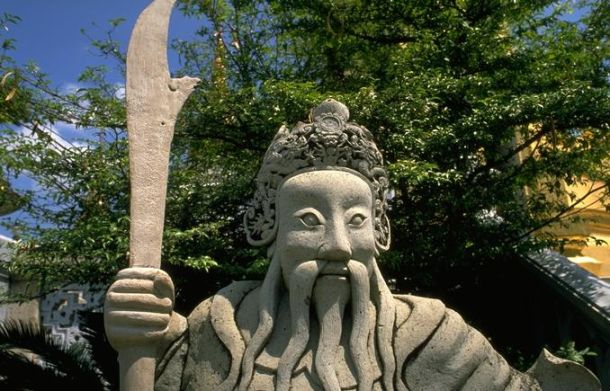Leadership Secrets of Nehemiah
Written by Mike Bennett
God calls on us to learn leadership. Why learn from brutal tyrants like Genghis Khan and Attila the Hun when we can learn from servants of God like Nehemiah?
 Last year a new book came out touting The Leadership Secrets of Genghis Khan. John Man’s book sells for a little over $6 and, according to its sole reviewer on Amazon, it gets a bit far-fetched in its assessment of the despot’s emotional intelligence. (Perhaps that’s part of the reason its Amazon Bestsellers Rank—at this time—is#609,618 in books.) Anyway, I didn’t find the description compelling enough to buy the book.
Last year a new book came out touting The Leadership Secrets of Genghis Khan. John Man’s book sells for a little over $6 and, according to its sole reviewer on Amazon, it gets a bit far-fetched in its assessment of the despot’s emotional intelligence. (Perhaps that’s part of the reason its Amazon Bestsellers Rank—at this time—is#609,618 in books.) Anyway, I didn’t find the description compelling enough to buy the book.
I was more tempted by the older (the paperback was published in 1990), shorter (only 110 pages) and more popular (Amazon Bestsellers Rank: #23,300) book Leadership Secrets of Attila the Hun. A used copy of Dr. Wess Roberts’ classic was listed at $0.01, but still I wasn’t sold enough to pay the shipping and handling.
Why all the books about tyrannical ancient leaders? Who’s next? Antiochus Epiphanes? Nero? Nimrod? Why not write a book about a good example from the Bible?
Well, I did find some, like The Dynamics of Effective Leadership: Learning From Nehemiah by Cyril Barber. However, I was slightly dismayed that even the used copies are selling for over $100. (Which explains why I haven’t read it, and perhaps helps explain its Amazon Bestsellers Rank:#1,882,748).
By now you can tell I’m cheap. I decided to go to a book I already have on my shelf and try to glean some of those biblical lessons myself.
Nehemiah and the power of prayer
 When Nehemiah came to understand the sorry state of God’s city, Jerusalem, and God’s people there, he took the problem to God in prayer and fasting. He not only asked for God to intervene, but offered himself to help in the work, if God would give him favor with King Artaxerxes (Nehemiah 1:4-11).
When Nehemiah came to understand the sorry state of God’s city, Jerusalem, and God’s people there, he took the problem to God in prayer and fasting. He not only asked for God to intervene, but offered himself to help in the work, if God would give him favor with King Artaxerxes (Nehemiah 1:4-11).
In spite of being “dreadfully afraid,” Nehemiah sent up another silent prayer as he asked the king for the time off and the resources needed for this major rebuilding project in a distant province (Nehemiah 2:1-8).
Nehemiah’s long record of faithful service plus God’s intervention led to the king approving his requests.
Nehemiah: master of motivation
Nehemiah arrived in Jerusalem and for three days didn’t tell the people why he was there. Imagine the suspense and interest this probably aroused. He spent part of that time checking out for himself the information he had received. He must have also polished up his speech to motivate, inspire and stir them to action. He had to show them that he understood the situation and that he was part of the same team. He wanted the people to see that God was on their side too.
“Then I said to them, ‘You see the distress that we are in, how Jerusalem lies waste, and its gates are burned with fire. Come and let us build the wall of Jerusalem, that we may no longer be a reproach.’ And I told them of the hand of my God which had been good upon me, and also the king’s words that he had spoken to me” (Nehemiah 2:17-18).
Setting out a clear and motivational goal and showing it was doable helped win over the distressed people. They replied, “‘Let us rise up and build.’ Then they set their hands to this good work” (Nehemiah 2:18).
Delegation and coordination
Nehemiah chapter 3 describes the specific assignments of various foremen all around the wall of Jerusalem. Each knew his specific assignment and could coordinate with his neighboring foremen. Further coordination was needed when the enemy threatened to attack (chapter 4). A large portion of the workforce had to be diverted to security, and the workers were growing weary. In addition to repositioning the workers and weapons, Nehemiah again saw the need to remind them of the stakes and help them remember that God was on their side. His motivational speech is recorded in Nehemiah 4:14.
Did Nehemiah’s methods work? Consider the fruits: “So the wall was finished on the twenty-fifth day of Elul, in fifty-two days” (Nehemiah 6:15). And this set the stage for the wonderful Feast of Trumpets and Feast of Tabernacles celebrations we read about in chapter 8.
Much more could be said about Nehemiah’s zeal, his single-mindedness, his courage in the face of opposition, his generosity, etc. You are welcome to add the lessons you find most valuable to this thread on the Church of God, a Worldwide Association, Facebook page. Feel free to add other principles of godly leadership and suggestions for future blog posts on this subject. We can use this as a chance for iron to sharpen iron as we discuss the important subject of godly leadership.
Mike Bennett is a husband, father and minister of the Church of God, a Worldwide Association, living in Ohio.








